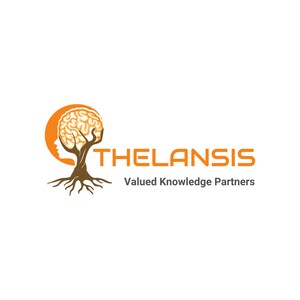HARTFORD, Conn., Feb. 22, 2024 /PRNewswire/ -- Thelansis Knowledge Partners is a specialized business research and consulting company that provides pharmaceutical and biopharmaceutical companies with data-driven research, insights, and decision-making support throughout the product life cycle.
Psychedelics (e.g., psilocybin, MDMA) are mostly Schedule 1 substances in the United States; however, given their potential to effectively treat psychiatric conditions, Thelansis's analysts are noting renewed interest in psychedelics's clinical development for medical purposes (with a significant increase in pipeline activity) and that potential approval pathways are under consideration with drug regulators. Specifically, multiple psychedelics (in association with psychotherapy) are in various phases of drug development for the difficult-to-manage psychiatric indications (e.g., severe PTSD, treatment-resistant depression, bipolar depression, suicidal ideation).1 Of psychedelics, MDMA-assisted psychotherapy (by Lykos Therapeutics [previously MAPS Public Benefit Corporation]) would be the first approved therapy for moderate to severe posttraumatic stress disorder (PTSD), which comprises approximately two-thirds of PTSD patients (based on Thelansis's primary market research).2 MDMA-assisted therapy is in preregistration in the United States and is expected to receive USFDA-approval in late-2024. Notably, few drugs are USFDA-approved for PTSD and with nearly half of moderate to severe PTSD patients achieving remission in three months after monthly administrations of MDMA-assisted therapy,3 this therapy is set to revolutionize the treatment of PTSD patients, as highlighted by a KOL.
The next psychedelic that could reach the U.S. market is COMP360 psilocybin therapy (by COMPASS Pathways) for treatment-resistant depression (TRD), which comprises nearly one-third of patients with major depressive disorder (MDD).2 The therapy is in Phase 3 of clinical development and could receive USFDA approval by 2026. Notably, the therapy targets some key clinical unmet needs in TRD patients, for example, a rapid onset of action, less-frequent dosing, durability of response.4 Because of psychedelics's unique treatment schedule (e.g., associated psychotherapy sessions) and expected regulatory hurdles (e.g., administration in designated centers to prevent misuse), many interviewed psychiatrists (by Thelansis) expressed the need for trainings by drug marketers and the need for guidelines to minimize the burden of logistics while drug administration. Thelansis research suggests that these therapies could have pricing potential similar to the annual cost of treatment for Janssen's Spravato (or S-ketamine, which belongs to another class of psychedelics) for TRD. Spravato, although launched for TRD in 2019, struggled postlaunch due to various factors, including market access hurdles, site-specific availability, and lack of clarity on the administration schedule for chronic treatment, as noted by some interviewed KOLs.2 Nevertheless, the drug reached nearly $600 million in sales (after rebates/discounts) in the United States in 2023.5
Thelansis forecasts blockbuster sales potential for each of the MDMA-assisted psychotherapy in moderate to severe PTSD and of COMP360 psilocybin therapy in TRD within five years of their respective U.S.-market launches.6
"I am excited to see such therapies in clinical practice and would welcome these developments in the field of psychiatry, primarily because psychedelics could resolve disease symptoms after few administrations, unlike current treatments requiring chronic administration and have limited effect sizes." "TRD patients encounter high burden of polypharmacy, with current therapies having low response and remission rates. Availability of psychedelic(s) with few administrations in a year and offering high remission rate could change the treatment pathway for these patients."
According to an interviewed U.S.-based neurologist by Thelansis – "We desperately need disease-modifying treatments for many neurodegenerative conditions. I hope that CNS field will witness novel therapies soon, including gene therapies for rare CNS disorders and more efficacious treatments for psychiatric disorders, for which patients have increased tremendously."
Closing statement:
As psychedelics would be beneficial for treatment-nonresponders or severe patients, the commercial opportunities are multiple for in-pipeline psychedelic therapies.
In addition, the report answers key questions such as,
- How large is the treatment-eligible patient pool for Psychedelics (e.g., psilocybin, MDMA) in the 8 major markets (including the U.S., EU5, Japan, and China)? How will this product change the market dynamics in the next ten years (2023-2033)?
- What is the probable opportunity for Psychedelics (e.g., psilocybin, MDMA) to address the unmet needs of other TAs? What will be the preferences of HCPs? Where does it fit in early lines and late lines of treatment? What are the KOL opinions/quotes on Psychedelics (e.g., psilocybin, MDMA)?
- What are the various patient segments that could be targeted?
- What is the market size (in terms of sales) for Psychedelics (e.g., psilocybin, MDMA)? What does the patient share? How will this landscape evolve in the next ten years?
Contact us today on ….
Website: Thelansis.com For more information, please contact:
Chinmaya Kumar Senapati
Email- [email protected]
+91-6397-349664
Logo: https://mma.prnewswire.com/media/2336260/THELANSIS_LOGO.jpg
SOURCE Thelansis Knowledge Partners LLP

WANT YOUR COMPANY'S NEWS FEATURED ON PRNEWSWIRE.COM?
Newsrooms &
Influencers
Digital Media
Outlets
Journalists
Opted In





Share this article